Change
Change
| Change: | The quality or power of inspiring belief; capacity for belief to make different in some particular way; alter; to make radically different; transform; to give a different position, course, or direction; to replace with another; to make a shift from one to another; switch; to undergo a modification; to become different; to pass from one phase to another. |
Are You Ready and Willing to Change?
Awareness is just the beginning.
Next, we examine 2 more elements of Change:
Readiness and Willingness.
Readiness
In our Readiness and Willingness to Change© Model,
we define Readiness this way.
Readiness is the measure of a person’s ability to succeed in a given situation. It reflects and reveals how prepared and competent the person is to succeed before starting.

A person may be aware of a problem and yet does nothing about it. He sees the option of using round wheels but, for whatever reason, intentionally decides to keep his square wheels.
- Is it possible that he does not know how to change wheels?
Is he ill equipped in some way?
Areas to consider regarding Readiness for Change
| Social: | Does the person have the interpersonal skills required for change? |
| Intercultural: | Does the person have the cultural knowledge to change? |
| Emotional: | Does the person have the emotional strength to change? |
| Spiritual: | Is the person ready to search for the meaning of life, the truth? |
| Mental: | Is the person cognitively able to learn what is needed to effect change? |
| Education: | Does the person have the education skills required for the change? |
| Physical: | Is the person physically ready to go through the change process? |
| Special Skills: | Does the person have the skills and training to successfully complete the responsibilities and tasks that are necessary for the change? |
| Style-Match: | Does the individual’s Personal Style match the roles and responsibilities of the new situation? |
Example
You have noticed a growth on your right knee. Tests confirm it is benign, but no doctor is available to operate for several weeks. But don’t worry; I have always been interested in medicine—I recall dissecting frogs in high school. I’ve never been to medical school but I’ve watched a lot of medical programs on TV and I have tools in my shop. Come over to my home on Saturday around 10 and we’ll get that growth taken off!
What is your confidence level in my ability (Readiness) to operate?
None, right? I don’t have the skills or the abilities to do it.
I am not ready to operate, even though I am willing.
We’ll return to Readiness shortly.
Willingness
The next element is Willingness, the measure of a person’s attitude and commitment toward success.
Areas to consider regarding Willingness to Change
| Cooperating with others: | Does the person work collaboratively as a team member? |
| Learning from others: | Does the person agree to let others teach him or her how to perform a task? |
| Helping others learn: | Does the person agree to teach others how to perform a task? |
| Accepting self and others: | Does the person show affection and caring for self and others? |
| Being appreciated by others: | Does the person let others show recognition and caring to him or her? |
| Being friends with others: | Does the person enjoy spending time with others? |
| Giving of self: | Does the person permit others to benefit from his or her experiences? |
| Being authentic: | Does the person permit others to know his or her feelings, opinions, and beliefs? |
| Forgiving self and others: | Does the person commit to solving conflicts? |
| Letting go of habits: | Is the person willing to let go of what he or she has been doing—the status quo—and embrace new behavior that may be more acceptable to others? |
| Letting go of excuses: | Is the person willing to stop using multiple reasons (excuses) for not participating in opportunities? |
Example
Many years ago, I worked in sales as a dairy specialist for an agricultural company. My sales tripled in my first 3 years and I was the top sales performer. During that time, I became engaged. Although it was a long-distance relationship—I was living in Vancouver, BC, and the lady was in Brisbane, Australia—it was manageable. I was in love and successful in my work and I had even started a small business on the side.
Everything was grand…until Valentine’s Day. My fiancée called from Down Under to say she had accepted a better offer. I was devastated. I lost 15 pounds in 15 days—the fastest weight-loss program in the world, but not recommended.
My sales performance started to slide.
- Did that have anything to do with my sales abilities? No. Because of my personal issues, my Willingness level had dropped.
If my sales manager had sent me to a sales-training refresher program on how to close the sale, would that have done any good? Not at all!
Ready and Willing Work Together
When we think of our success and the success of others in this life, we see we must be aware of our environment; we must be readyand willing to make the changes we seek or that others may be asking us to make.
Whether you work alone or with others, and things are not going well, is the lack of success a Readiness issue, a Willingnessissue, or a combination of both?
The CRG Readiness and Willingness to Change© Model will equip you to understand yourself and others better than ever before.
Do you recall times when people—perhaps you—were promoted into jobs or roles without the proper training? Worse, they had few abilities (Readiness) to fulfill the responsibilities and little interest in the new job (Willingness). Rather than being forthright about the situation, their fear or pride put them into a no-fly zone. Soon, no one was happy with their work performance.
Over time, a shift in willingness can take place in the workplace. Individuals who were energized and very productive in their roles can lose interest. Maybe they are disappointed to learn their job role is not what they expected; perhaps the job style required by the position doesn’t match their Personal Style. As a result, their willingness decreases.
When you think about the level of your success and the success of others, keep in mind the concept of Readiness and Willingness.
Ask yourself this question: Am I not succeeding because of a lack of Readiness (ability) or a lack Willingness (attitude) to change… or both?
To help you answer that question, here is a grid that can be applied to just about any situation. We all have what I call a Situational Readiness and Willingness to Change.
Four Development Levels (D-Levels)
|
D-Levels |
1 |
2 |
3 |
4 |
|
|
Resistant |
Reasonable |
Responsible |
Resourceful |
|
Ready to Change |
Not ready; unable to proceed |
Ready to consider change, to think and talk about it |
Ready to get involved and learn how and what to change |
Ready to develop full potential and skills levels |
|
Willing to Change |
Not willing; insecure; fights help |
Willing to listen to alternatives |
Willing to take action now |
Willing to help others develop |
This information expands each D-level.
Level 1: Resistant
- Is not ready or willing to change or succeed
- Is self-focused, self-centered, self-destructive
- Is uncooperative, noncompliant, disruptive of the team, unmotivated
- Is unable and/or unskilled to perform
- Is critical, verbally abusive; an accuser, a blamer
- Is angry, argumentative, nontrusting
- Is in denial; refuses to change; doesn’t think he
or she needs to change
Level 2: Reasonable
- Is somewhat ready and willing to learn, change, succeed
- Is only ready and willing to think and talk about learning, changing, succeeding
- Has a “What’s in it for me?” attitude
- Is agreeable to negative feedback and change but
behavior remains the same - Is motivated by others; a team follower
- Is overcontrolling of self
Level 3: Responsible
- Is ready and willing to learn, change, succeed
- Is self-motivated to improve self, situations
- Is cooperative; a team-player, a contributor
- Is capable of performing responsibilities
- Is verbally positive; an encourager, supportive
- Is confident, assertive; respects self and others
- Transforms potential into production
- Is in control of self
Level 4: Resourceful
- Is ready and willing to learn, change, and succeed
AND help others do so - Personally functions at Level 3
- Is driven by the vision of people-development
- Motivates others to improve; inspirational
- Is able to teach others the required skills and knowledge
to succeed - Leads others from the present into the future; is honest
and ethical - Is a professional leader in control AND helps others
increase control of self
Keep in mind Level 4 infers you are not only Ready and Willing to succeed yourself, you are ready and willing to help others do the same. Leading others to success requires quite a different skillset. Unless you are able to teach and inspire others in their success, consider Level 3 as your target.
Until next time, keep Living On Purpose!
Ken Keis

How Ready and Willing are you to succeed?
Let’s find out.
To assess your willingness to change try the Willingness Quiz







